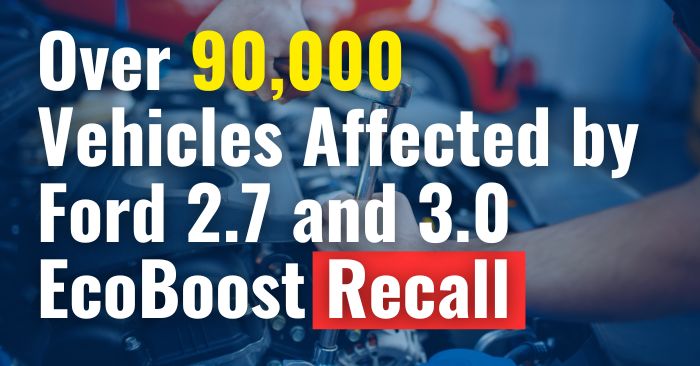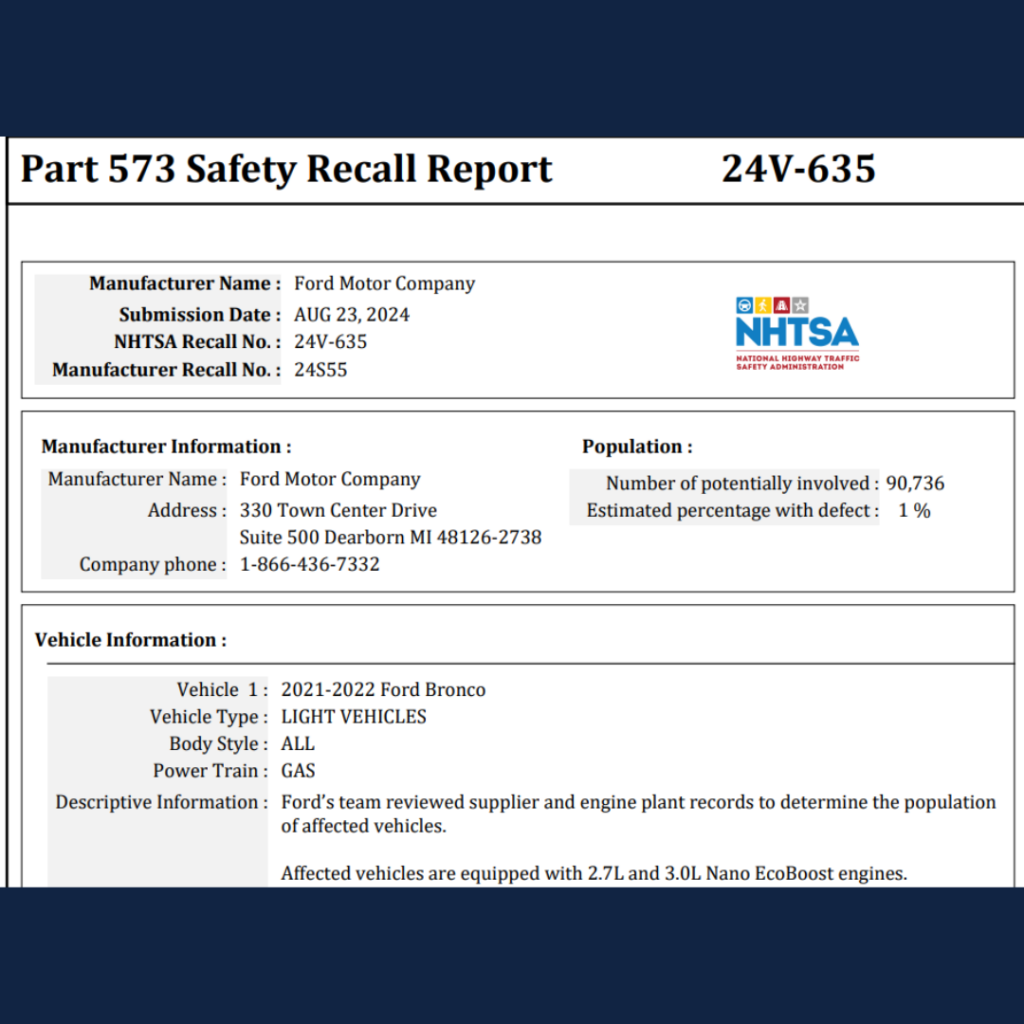
Written By: Jessica Anvar Stotz
Legally Reviewed By: Jessica Anvar Stotz

Ford has issued a recall for 90,736 vehicles equipped with the 2.7-liter and 3.0-liter EcoBoost engines due to a potential engine failure risk.
The recall affects several models, including the 2021-2022 Ford Bronco, F-150, Edge, Explorer, Lincoln Nautilus, and Aviator.
The issue stems from faulty intake valves that may break, leading to engine failure and a loss of drive power.
It is estimated that roughly 907 of the 90,736 recalled vehicles may be affected.
| Affected Vehicle | Engine Type | Average Lemon Law Settlement |
| Ford Bronco | 2.7L/3.0L Nano EcoBoost | $72,732 |
| Ford F-150 | 2.7L Nano EcoBoost | $96,936 |
| Ford Edge | 2.7L Nano EcoBoost | $69,908 |
| Ford Explorer | 3.0L Nano EcoBoost | $78,366 |
| Lincoln Nautilus | 2.7L Nano EcoBoost | $92,887 |
| Lincoln Aviator | 3.0L Nano EcoBoost | $115,272 |
*Please note, the figures presented in the chart are approximations based on results from previous cases and should not be interpreted as a prediction or guarantee. Each case is unique and requires personalized legal guidance.
What’s Wrong with the EcoBoost Engine Intake Valve?
The issue with the EcoBoost engine intake valves is that they are prone to breaking due to manufacturing defects.
Specifically, the intake valves in the affected engines are made from a material called Silchrome Lite, which can become excessively hard and brittle if an over-temperature condition occurs during machining.
This brittleness increases the likelihood of the valves cracking and breaking while driving, which can lead to engine failure and a loss of drive power.
Ford has identified this problem in the 2.7-liter and 3.0-liter EcoBoost engines used in several models, including the Ford Bronco, F-150, Edge, Explorer, Lincoln Nautilus, and Aviator.
The company is currently addressing the issue by performing engine cycle tests and replacing the engines as necessary.
Have There Been Other EcoBoost Recalls?
Yes, there have been other recalls and issues related to Ford’s EcoBoost engines. Here are two notable ones.
Ford previously issued a recall for its 1.0-liter EcoBoost engines due to the risk of engine fires. This recall affected models like the Ford Fiesta and Focus.
The issue was related to a coolant hose that could potentially crack and leak, leading to engine overheating and, in some cases, fires.
This recall is unrelated to the current 2.7L and 3.0L EcoBoost recall, as it involves a different engine size and a completely different issue.
There has also been a class-action lawsuit involving the 1.5L, 1.6L, and 2.0L EcoBoost engines. Owners of these engines reported issues such as coolant leaks leading to engine overheating and, in some cases, engine failure.
The lawsuit claims that Ford was aware of these defects but did not take adequate steps to address them.
This lawsuit is unrelated to the current recall for the 2.7L and 3.0L engines, as it involves different engine sizes and issues.

How Will Ford Rectify the Engine Problem?
Ford is employing the follow steps to address the engine problem in the 2.7L and 3.0L EcoBoost engines:
- Engine Cycle Test: Ford dealers will perform an engine cycle accumulation test on the affected vehicles. This test helps determine if the engine has experienced excessive wear or damage due to defective intake valves.
- Engine Replacement: If a vehicle fails the engine cycle test, the engine will be replaced at no cost to the owner. This ensures that any potential issues are fully resolved, and that the vehicle is safe to drive.
- Communication and Reimbursement: Ford will notify affected customers starting October 7, 2024. Additionally, owners who previously paid for repairs related to this issue may be eligible for reimbursement.
These steps are designed to ensure that the affected vehicles are safe and reliable, addressing the problem of brittle intake valves that could lead to engine failure.
Ford has attempted to address the issue with the 2.7L and 3.0L EcoBoost engines through several Technical Service Bulletins (TSBs).
The specific problem with the intake valves breaking due to brittleness, however, is not directly mentioned in Ecoboost TSBs.
Most TSBs related to these engines focus on other issues, such as oil leaks from the oil pan RTV seal. For example, TSB 19-2249 and its update TSB 19-2387 address oil leaks in the 2.7L and 3.0L EcoBoost engines for various models, including the Ford Edge, Fusion, and Lincoln Continental.
These bulletins provide procedures for replacing the oil pan with a new one equipped with a press-in-place gasket to resolve the oil leak issue.
While these TSBs are related to the 2.7L and 3.0L EcoBoost engines, they do not cover the specific intake valve issue that led to the recent recall.
Steps for Owners with Repeat Engine Trouble
Here’s a list of steps for owners experiencing repeat engine trouble with their Ford 2.7L or 3.0L EcoBoost engine:
- Contact Your Dealer: Reach out to your local Ford dealership to report the issue. Provide them with your vehicle’s VIN and a detailed description of the problems you’re experiencing.
- Schedule an Inspection: Arrange for a thorough inspection of your vehicle. The dealership will perform an engine cycle accumulation test to determine if the engine has suffered from the faulty intake valves.
- Engine Replacement: If the test indicates that your engine is affected, the dealership will replace the engine at no cost to you. This is part of Ford’s recall remedy to ensure your vehicle is safe and reliable.
- Keep Records: Maintain detailed records of all communications, inspections, and repairs. This documentation can be crucial if you encounter further issues or need to escalate the matter.
- Contact Ford Customer Service: If you continue to experience problems or are unsatisfied with the dealership’s response, contact Ford’s customer service at 1-866-436-7332. Reference recall number 24S55 for the intake valve issue.
- Report to NHTSA: If you believe your vehicle’s safety is compromised and the issue is not being adequately addressed, you can file a complaint with the National Highway Traffic Safety Administration (NHTSA) at 1-888-327-4236 or visit safercar.gov.
- Consult with a Lemon Law Attorney: If your vehicle continues to have issues despite multiple repair attempts, consider consulting with a lemon law attorney. They can help you understand your rights and potentially assist in getting a replacement vehicle or a refund under your state’s lemon law.
Following these steps will help ensure that your vehicle is properly inspected and repaired.
The Lemon Law Experts can Assist You!
If you’re having problems with your Ford 1.0L or 2.7L EcoBoost engine, a knowledgeable attorney can advise you on your consumer rights and determine whether your case qualifies for a lemon law claim.
Lemon law attorneys excel at negotiating with manufacturers and dealerships on your behalf. If legal action is required, your attorney will defend you in court, overseeing all areas of the litigation process to safeguard your rights.
The Lemon Law Experts provide expert legal representation to individuals dealing with defective Ford vehicles, notably those equipped with the 2.7L EcoBoost engine.
Since 2009, our attorneys have successfully obtained substantial compensation for customers through refunds and settlements with major automakers such as Ford.
If you have questions regarding your Ford 2.7L EcoBoost engine or need help filing a lemon law claim, The Lemon Law Experts are here to help.
Citations
Ford Motor Company. (2019). Technical Service Bulletin: 2.7L EcoBoost Engine—Gasket Replacement for Oil Pan Leaks. NHTSA. https://static.nhtsa.gov/odi/tsbs/2019/MC-10164425-0001.pdf.
Ford Motor Company. (2019). Technical Service Bulletin: Engine Misfire Diagnosis for 3.5L EcoBoost Engine. NHTSA. https://static.nhtsa.gov/odi/tsbs/2019/MC-10169894-0001.pdf.
Top Class Actions. (n.d.). Ford Recalls Vehicles with EcoBoost Engines. Retrieved from https://topclassactions.com/lawsuit-settlements/lawsuit-news/ford-class-action-lawsuit-and-settlement-news/ford-recalls-vehicles-with-ecoboost-engines/.
Ford Motor Company. (2024). Recall Notice: Loss of Power Due to Engine Control Module (ECM) Software—Safety Recall 24V-635. NHTSA. https://static.nhtsa.gov/odi/rcl/2024/RMISC-24V635-2546.pdf.
Ford Motor Company. (2024). Safety Recall Report: 24V-635. NHTSA. https://static.nhtsa.gov/odi/rcl/2024/RCLRPT-24V635-5852.PDF.
Bowman, Z. (2023, September 28). Ford Recalls F-150, Bronco, Explorer, and Other Models for Engine Failures. Car and Driver. Retrieved from https://www.caranddriver.com/news/a62044486/ford-f150-bronco-explorer-edge-lincoln-nautilus-aviator-engine-failure-recall/.




